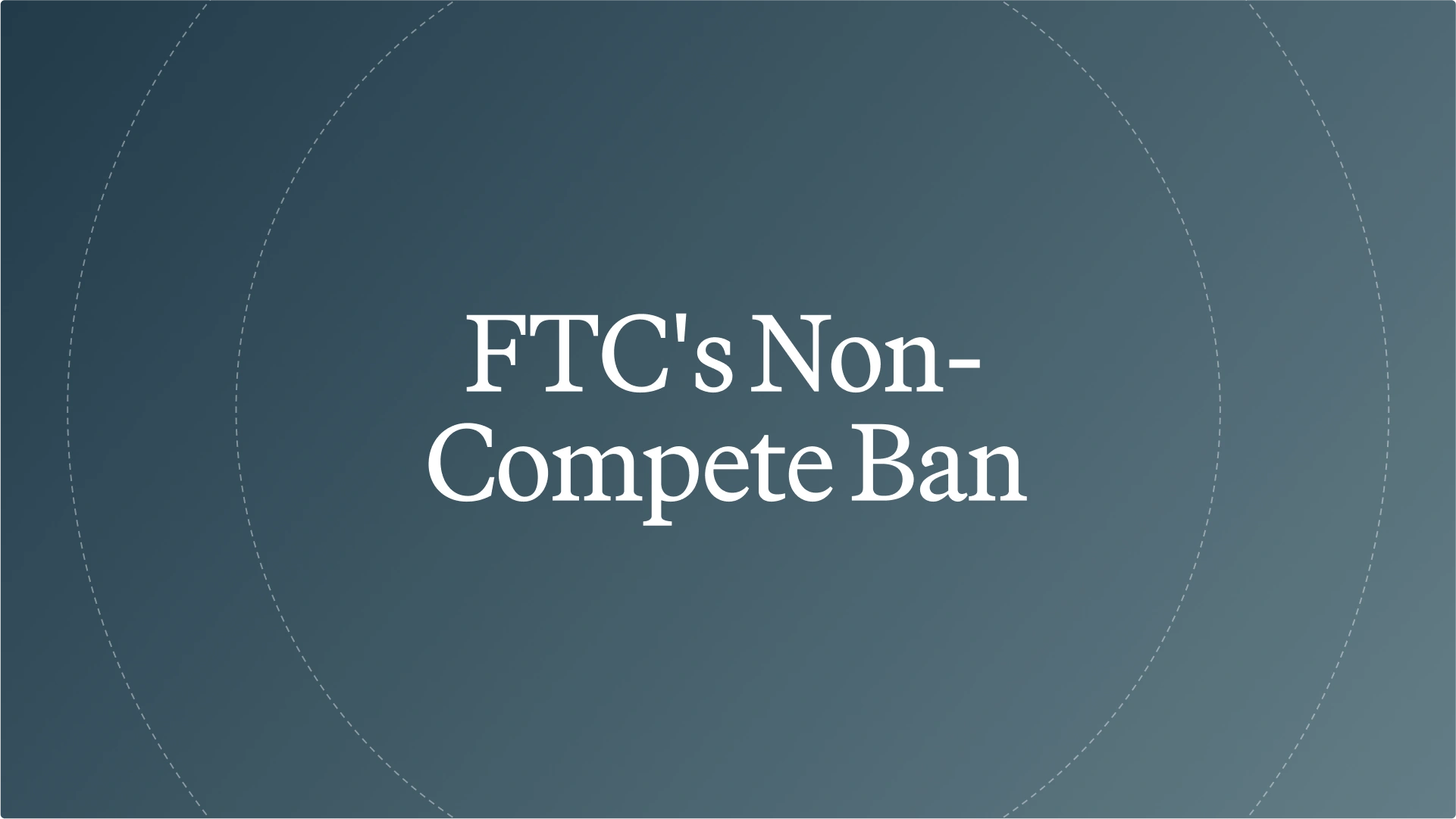.svg)
Product
Solutions

Featured:
Read how a Cincinnati hospital system slashed contract review time by 75% with LegalOn.
Resources
Company


On April 23, 2024, after reviewing over 26,000 public comments, the Federal Trade Commission (FTC) issued its final rule banning the use of non-compete clauses in employment agreements with limited exceptions. This landmark regulation, which the FTC estimates will impact nearly 101.8 million American workers, aims to protect employees' freedom to change jobs, spur innovation, and foster business formation.
As FTC Chair Lina Khan stated, “Noncompete clauses keep wages low, suppress new ideas, and rob the American economy of dynamism, including from the more than 8,500 new startups that would be created a year once noncompetes are banned.” The FTC also estimates that this rule will increase wages for the average worker by an additional $524 per year, and that it may lower healthcare costs by up to $194 billion over the course of the next ten years.
The rule becomes effective September 4, 2024.
After the effective date, the FTC rule imposes a comprehensive ban on new non-competes with all workers. The rule will also prohibit employers from attempting to enter into new noncompetes, enforcing or attempting to enforce existing non-competes with workers other than senior executives, or representing to workers other than senior executives that they are bound by non-compete clauses.
With respect to existing non-competes entered into before the final rule’s effective date, the FTC adopts two different approaches, one for senior executives whose existing noncompetes can remain in force and one for all other workers, whose existing non-competes will no longer be enforceable. The rationale for this distinction is that senior executives are “less likely to be subject to the kind of acute, ongoing harms currently being suffered by other workers subject to existing non-competes.”
A non-compete is defined as “a term or condition of employment that prohibits a worker from, penalizes a worker for, or functions to prevent a worker from (1) seeking or accepting work in the United States with a different person where such work would begin after the conclusion of the employment that includes the term or condition; or (2) operating a business in the United States after the conclusion of the employment that includes the term or condition.”
Notably, the term “worker” is defined broadly such that it includes, but is not limited to, current or former employees, independent contractors, interns, externs, volunteers, apprentices, and sole proprietors that provide service to a person.
In addition to traditional non-compete covenants, the ban also encompasses any agreement that functions as a non-compete by penalizing competition or imposing overly broad restrictions:
However, the FTC rule does not void all restrictive covenants. Reasonable NDAs and non-solicitation agreements narrowly tailored to protect legitimate business interests generally remain enforceable. Non-competes are also still permitted in limited contexts, such as owners selling a business and franchisor/franchisee relationships.
By the rule's effective date, employers must provide individualized written paper or electronic notice to all workers currently bound by a non-compete informing them that the clause will no longer be enforced against them. The FTC provides safe harbor model notice language employers can use. Employers do not have to formally amend or rescind existing non-competes, but simply provide the required notice.
The only non-competes employers may still honor (without entering into new ones) are those with certain senior executives. In general, to qualify the worker must be earning at least $151,164 and be in a policy-making position. The FTC estimates this exception covers less than 0.75% of the workforce.
With the myriad of agreements potentially impacted by the FTC non-compete ban, employers face a daunting task in reviewing existing contracts to identify provisions that may run afoul of the new rule or require a compliance notice. This is where AI-powered tools like LegalOn can be a major asset.
By rapidly scanning a company's entire contract repository, LegalOn's AI can flag any potentially problematic clauses much more efficiently than manual attorney review. This allows employers to quickly discover non-compliant language lurking in:
If revisions to contract templates are necessary to align with the FTC rule requirements, LegalOn can also help redline existing language based on attorney instructions to help ensure all future agreements contain compliant provisions.
The FTC's new non-compete ban represents a seismic shift in US employment law that will require significant employer action to adapt to the changing legal landscape. Leveraging the power of AI to efficiently analyze contracts for compliance gaps will be an essential strategy to mitigate risk as the effective date approaches. Employers should work closely with knowledgeable legal counsel to audit existing agreements, prepare required notices, and implement updated restrictive covenant terms tailored to the FTC's mandates.
Learn more about how LegalOn’s suite of AI Contract Review tools can help you comply with the FTC’s noncompete ban, and book a meeting with a member of our team here.

